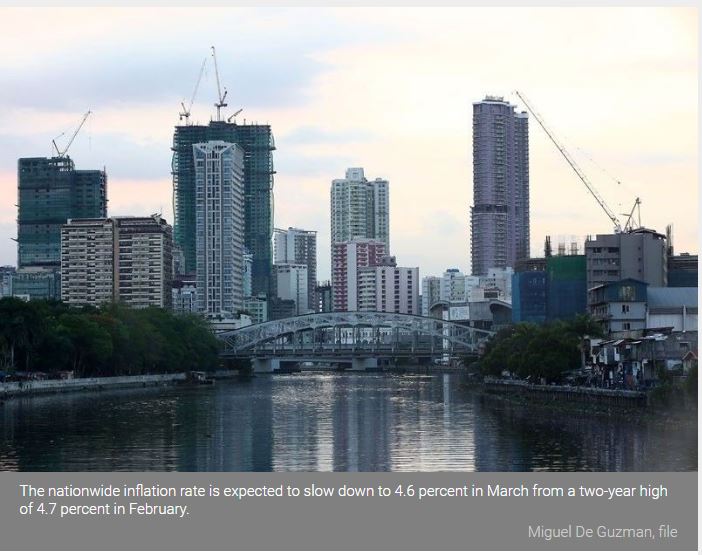Philippines: BSP sees inflation easing slightly to 4.6% in March
MANILA, Philippines — Inflation likely eased in March amid cuts in electricity rates in areas serviced by Manila Electric Co. (Meralco) as well as cheaper food items due to improved supply conditions and the continued implementation of price caps on meat products, according to the Bangko Sentral ng Pilipinas (BSP).
The nationwide inflation rate is expected to slow down to 4.6 percent in March from a two-year high of 4.7 percent in February.
“Moving forward, the BSP will continue to monitor evolving economic and financial conditions to ensure that the monetary policy stance remains consistent with the BSP’s price stability mandate,” the central bank said.
Inflation averaged 4.5 percent in the first two months after breaching the BSP’s two to four percent target in January and February primarily due to supply side shocks caused by weather-related disturbances as well as the African swine fever (ASF) outbreak.
BSP Governor Benjamin Diokno earlier said the Philippines was not experiencing reflation, as the higher inflation in recent months was due mainly to transitory supply-side pressures on a narrow range of agricultural products and world oil price increases.
“Reflation is the act of bringing inflation from very low levels back up to its long-term trend after a period of disinflation and economic downturn. This is not the case,” Diokno said.
Nevertheless, the BSP is closely monitoring possible second-round effects from the ongoing supply shocks. It has, however, assigned low probability on the likelihood of second-round effects due to the present level of capacity underutilization and underemployment in the economy.
Although it is a delicate balance in the near term given the uptick in inflation, Diokno said the recent decision of the Monetary Board to keep policy settings unchanged remains key to allowing previous monetary policy support measures to work their way through the economy as demand-based pressures on inflation remain largely subdued.
The BSP’s monetary policy stance continues to be supportive of domestic demand, while the economy remains in its nascent recovery phase.
“The BSP and the national government policy responses continue to focus on closing the output gap, given the substantial excess capacity in the economy and the underemployment rate in the labor market,” Diokno said.
During its last rate-setting meeting on March 25, the Monetary Board raised its inflation forecasts to 4.2 percent this year and to 2.8 percent next year due to the higher-than-expected outturn in February as well as higher projections for global oil prices.
BSP Deputy Governor Francisco Dakila Jr. said there is no need for monetary policy response as the elevated inflation is coming from supply side such as the ASF)affecting the prices of meat.
“We see that the timely implementation of these measures to address directly the sources of the supply shocks in particular meat will help to dampen inflation and to bring inflation within the target patch towards the fourth quarter of this year,” Dakila said.
Dakila said inflation path is below five percent for the entire year despite staying above the high end of the two to four percent target until the third quarter.
“At this moment, there is really no evidence of any spillovers to other commodities apart from those that are subject to the supply shocks. And these commodities are few key food items including meat in particular,” Dakila said.
Source: https://www.philstar.com/business/2021/04/01/2088383/bsp-sees-inflation-easing-slightly-46-march


 Thailand
Thailand




